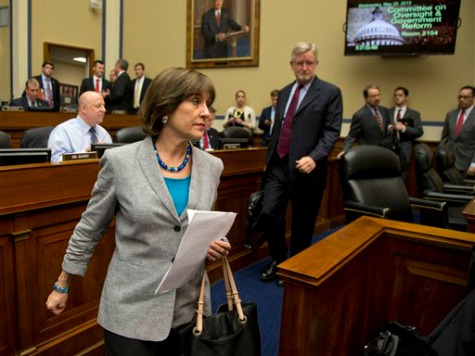
On Tuesday, William W. Taylor III, attorney for Lois Lerner, the IRS official at the center of the Tea Party targeting scandal who invoked her Fifth amendment rights before the House Oversight and Government Reform Committee on May 22, set forward his client’s hard line conditions to return and testify openly before the committee.
“They can obtain her testimony tomorrow by doing it the easy way … immunity. That’s the way to resolve all of this,” he told Politico.
Congressman Jim Jordan (R-OH), a member of the House Oversight and Government Reform Committee was unimpressed. “We hope she comes in and gives us the truth and answers questions. If that doesn’t happen, then you cross the next bridge. … If she says, ‘No, I’m going to come in and assert my Fifth Amendment rights again and not going to speak,’ then you think about what the other options are.”
Legal experts have debated whether Ms. Lerner waived her fifth amendment rights when she delivered an opening statement declaring her innocence prior to invoking those rights. On June 28 in a 22-17 party line vote, the House Oversight and Government Reform Committee ruled that she did waive her Fifth amendment rights with that opening statement.
Should Ms. Lerner continue to insist that she will not testify without full immunity, the next step in this battle of wills and legal tactics could be a vote by the full House of Representatives to determine if Ms. Lerner is in contempt of Congress. If the full House determines she is in contempt, a criminal rather than civil charge, Ms. Lerner could face jail time.
Ms. Lerner’s attorney appears unphased by the possibility his client could face contempt charges. “[N]obody likes to be held in contempt of Congress, of course, but the real question is one that we’re fairly confident about, and I don’t think any district judge in the country would hold that she waived.”
Should the House hold Ms. Lerner in contempt, it would be the responsibility of the U.S. Attorney for the District of Columbia, an employee of the Department of Justice, to prosecute the case. Since Attorney General Eric Holder, who runs the Department of Justice, has already experienced his own difficulties surrounding his testimony before the House of Representatives, it is unlikely, though not impossible, that the U.S. Attorney for the District of Columbia would pursue prosecution of any contempt charges coming out of the House.
The penalty for contempt of Congress is a fine of $1,000 and up to one year in jail.

COMMENTS
Please let us know if you're having issues with commenting.